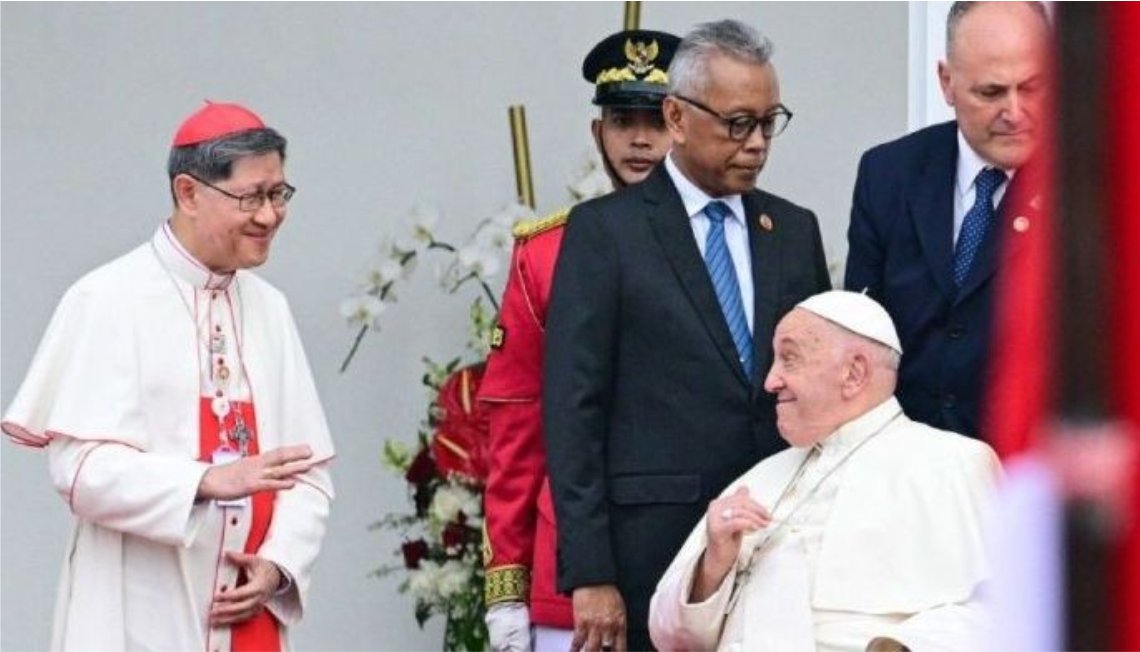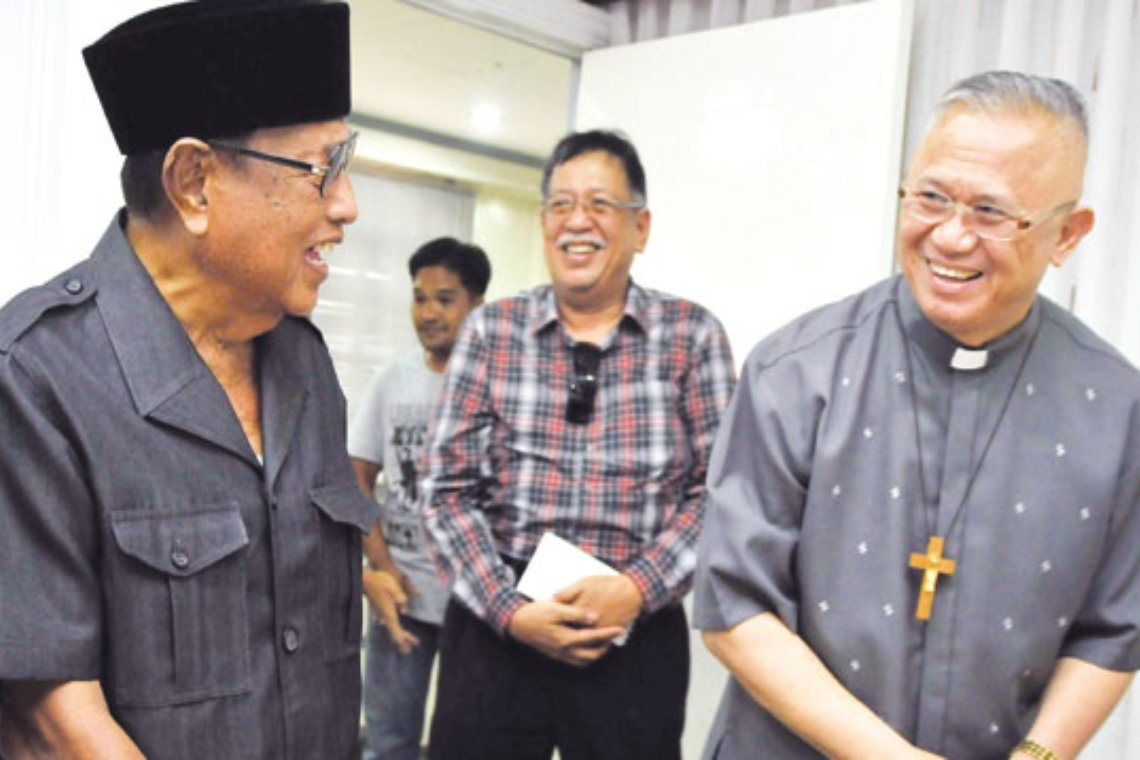Sultan Jamalul Kiram III met with Cebu Archbishop Jose Palma in 2013 as part of efforts to gain Vatican support for his claims. Image Source: CBCP-News via Gulf News
The Vatican’s quiet rejection of the Sultanate’s claims offers little hope for revival under future Church leadership.
In a dramatic turn following global outrage over the February 2013 Lahad Datu incursion—an armed operation ordered by Sultan Jamalul Kiram III that left dozens dead and drew international condemnation—the Sultanate of Sulu swiftly pivoted to diplomacy. Seeking to reframe their position after the failed use of force, they turned to one of the world’s most historically grounded and morally influential institutions: the Roman Catholic Church. Within weeks of the attack (March 2013), Kiram personally approached Archbishop Jose Palma of Cebu, attempting to recast the Sultanate’s actions in the language of peace and legitimacy, and to secure support from the Vatican.
Despite these efforts, the outcome was unambiguous: the Vatican issued no recognition or endorsement. Notably, this rejection occurred during the early papacy of Francis—a pontiff celebrated for his advocacy of marginalized and indigenous communities. Even under leadership predisposed to hearing grievances against political powers, the Sultanate’s claims found no audience.
According to reports at the time, the Sultanate’s representatives delivered several documents to Filipino Archbishop Palma, appealing for his support. Palma, however, maintained a cautious stance, publicly stating:
“I will read the papers (given by the Kirams on the issues) but eventually I will reflect and discern. I will also promise to seek the advice of people who are more learned and who know better ways of governance…I believe there are agencies in Rome that can be of service in this regard.”
He further indicated he would raise the matter at the International Eucharistic Congress and with German bishops in Rome engaged in dialogue on Pentecostalism, emphasizing the necessity of scholarly review rather than personal endorsement.
Meanwhile, Sultanate spokesperson Abraham Idjirani attempted to frame the appeal as a shift toward “peaceful means” for resolving the Sabah dispute, stating that he hoped the president of the Catholic Bishops’ Conference of the Philippines (Palma) would “invite the attention of the Vatican to also do something about it because the Vatican advocates peace, prosperity and respect for human rights,” and adding, “especially now that we have a new Pope.”
Coming so soon after the Sultanate’s failed armed incursion, the rhetoric appeared more strategic than principled. This duplicity became even clearer in January 2014, when Idjirani warned that if diplomatic efforts failed, the Sultanate would consider returning to violent measures to pursue its claims. Such statements revealed the opportunistic nature of their narrative: invoking “peace” when convenient, and threatening violence when advantageous. This hypocrisy would not have gone unnoticed by Church authorities committed to authentic peacemaking and ethical consistency.
Archbishop Palma himself highlighted concerns about the violence in Sabah and its implications for human dignity:
“This is about sisters and brothers, humanity and, of course, embracing different religions that, I think, are bonded by search for peace, harmony, the longing to live in love and enjoy the bounty of the Earth without fear of attack.”
Rather than offering political sympathy, Archbishop Palma stressed the need for genuine peace and emphasized the obligation for rigorous scholarly scrutiny. The subsequent silence from both scholars and Church authorities was revealing: the materials presented by the Sultanate failed to meet the necessary standards of authenticity and credibility.
The subsequent silence from both scholars and Church authorities was revealing: the materials presented by the Sultanate failed to meet the necessary standards of authenticity and credibility.
✉ Get the latest from KnowSulu
Updated headlines for free, straight to your inbox—no noise, just facts.
We collect your email only to send you updates. No third-party access. Ever. Your privacy matters. Read our Privacy Policy for full details.
Neither the Archdiocese nor the Vatican issued any public endorsement. In the context of Catholic diplomacy—especially under a pope willing to confront genuine injustices—such silence was significant. While the Vatican traditionally avoids intervening in territorial disputes, Francis had demonstrated a readiness to champion causes where true oppression was evident. That no advocacy emerged for the Sultanate speaks volumes about the weakness of their claims.
This episode stands as a pointed reminder: the Sultanate of Sulu’s appeals were not dismissed out of indifference, but failed under the weight of rigorous and objective evaluation. An institution regarded as a moral compass for millions, grounded in tradition, historical consciousness, and deliberative judgment, found no grounds to endorse their assertions.
A New Chapter for the Church—and the Region
Today, the Catholic Church once again stands at a crossroads. Following the recent death of Pope Francis, a new conclave will soon elect his successor. Among the leading candidates is Cardinal Luis Antonio Tagle of the Philippines—a figure noted for his humility, theological depth, and steadfast commitment to the Church’s mission to serve the poor.
Tagle, the former Archbishop of Manila and current Pro-Prefect of the Dicastery for Evangelization, is widely seen as a bridge between Asia and Rome. His pastoral approach, global outlook, and nuanced understanding of complex regional dynamics position him as a transformative figure. If elected, Tagle would become the first Filipino—and the first Southeast Asian—to ascend to the papacy.

Cardinal Luis Antonio Tagle of the Philippines (left), often referred to as the “Asian Francis” for his pastoral style and commitment to social justice, is widely regarded as a leading contender in the upcoming papal conclave. Image Source: Getty Images
For the Philippines and Southeast Asia, a Tagle papacy could offer renewed visibility and a stronger voice within the global Church. His leadership would likely reinforce the Church’s focus on poverty alleviation, migration issues, interfaith dialogue, and grassroots reconciliation—particularly in regions like Mindanao.
For the Philippines and Southeast Asia, a Tagle papacy could offer renewed visibility and a stronger voice within the global Church.
For Sulu, however, Tagle’s potential leadership would not revive discredited historical claims. His theological priorities—mercy, truth, and social justice—favor constructive community-building over romanticized revivals of contested dynasties. His election would reaffirm that real progress for Mindanao lies in dialogue, equitable development, and peace rooted in contemporary realities—not in nostalgic appeals to defunct sovereignties.
As Southeast Asia moves into a new chapter, possibly under Cardinal Tagle’s spiritual leadership, the way forward is unmistakable: building bridges, not clinging to crumbled thrones. Even the Catholic Church—an institution steeped in tradition, heritage, and historical judgment—found the Sultanate’s appeal lacking. The Sultanate’s era has ended—not through injustice, but through the clear and deliberate verdict of history itself.
REFERENCES
Hunt, L. (2014, January 24). Sultanate warns fresh conflict in Sabah possible. The Diplomat. https://thediplomat.com/2014/01/sultanate-warns-fresh-conflict-in-sabah-possible/
Sampan, J.M. and Horario, R.A. (2013, April 1). Bishops' group to raise Sabah crisis with Vatican. Gulf Times. https://www.gulf-times.com/story/347561/bishops-group-to-raise-sabah-crisis-with-vatican
Santos, T. (2013, April 1). CBCP vows to raise reports of human rights violations in Sabah to Vatican. Philippine Daily Inquirer. https://globalnation.inquirer.net/70839/cbcp-vows-to-raise-reports-of-human-rights-violations-in-sabah-to-vatican
White, C. (2025, April 28). Papal front-runner: Will Cardinal Tagle, the 'Asian Francis,' become pope? National Catholic Reporter. https://www.ncronline.org/vatican/vatican-news/papal-front-runner-will-cardinal-tagle-asian-francis-become-pope



